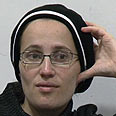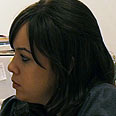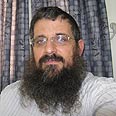


Three haredi women, separated or divorced, have agreed to expose their lives in a new film dealing with the difficult and painful issue of divorce among haredim.
The women, in their 20s and 30s, talk about the hardships haredi women face when choosing to separate from their spouses, how society treats them because of it, and the process of dismantling the family.
The movie "Alone" was director Shmuel Minkov's final project as a senior at Israeli film school Ma'aleh in Jerusalem. It opens with the following statement: "Until recently, this was a rare phenomenon among the haredi community, but during the past few years there has been an increase in divorce rates."
Toby, Rivki and Zehava, the three leading ladies of the movie, all live in Bnei Brak. All three agreed to let the cameras into their lives and even expose their children – a very uncommon thing in the haredi sector.
"They agreed to the exposure because this issue is important to them," Mionkov said. "It's important for them to talk and bring up this issue. They are very courageous for deciding to tell their story."
'Divorce certificate - good thing'
Toby, 28, comes from the Lithuanian Orthodox sector. She is a mother of three and has been divorced for three years. "When I decided to get divorced I found out I was pregnant," she speaks candidly in the movie. "People think that a divorce certificate is a bad thing, but sometimes it's exactly the opposite."
We meet Zehava at the beginning of the film, at a moment of weakness and fear of loneliness. Eventually we learn that she rebuilt her life and remarried. Together with her new husband, she raises her four children from her previous marriage and their two joint children.
"At the time no one knew I was going through a divorce," she says on camera. "No one - not even my parents. When I finally made the move I was sure I'd be an outcast. That my children would get kicked out of school. I realized that I might even have to move to a different city, begin a new life for the kids, so they'll have a normal home."
Rivki, a mother of three belonging to the Hassidic camp, separated from her husband over seven years ago. It is she, with her soft spoken ways and the pain she managed to convey, who is able to capture the complex problems the single-parent haredi women face.
At one point in the movie, during Sukkot, her two young children are filmed as they build the sukkah, just like their neighbors, with a few wooden boards and coating. They sit there, in their tiny semi-sukkah, wishing for a real one.
Avoiding the sensationalistic trap
Minkov is a rare bird in the film world. He's 45, a father of seven and a teacher, who decided to study film as well. His work on the film, which was screened last weekend as part of the graduation ceremony at film school Ma'aleh, took more than two years.
"I find it fascinating to dive into a world you're sure you know, but then discover you don't know it at all," he said. "Until a random meeting with Aharon Malach, executive director of the nonprofit organization Em Habanim, which helps haredi divorcees, I was naively sure this phenomenon was very uncommon."
The director said he tried to avoid the sensationalistic traps. "I was interested in the day-to-day coping, during the holidays or on the kids' birthdays," he said. "I tried to not discuss too much the reasons for the divorce, because I wasn't interested in making a movie about what once was. The object is to focus on the 'now', the present. The movie was created and fell apart dozens of times. We didn't know where to begin or what to put in. There were lots of good parts, and the editing process itself took about a year."
In the months before the film, Minkov focused on building a trusting relationship with the women. "At first there was much suspicion," he admitted. "They didn't know who I was or what I was going to do. But a bond was formed quickly enough. Plenty of good material wasn't used, like discussions about the hardships within the extended family. I followed them and they trusted me completely. It was worth it, as far as they're concerned."
Toby, Rivki and Zehava were present during the premiere. They saw themselves for the first time on screen. "I hadn't shown them anything up until then," said Minkov. "They were very excited during the premiere. I saw them sitting and crying."
Minkov has no plans to rest. His next project is a mini-series about the haredi public. "It's just another dive into an unfamiliar world."
- Follow Ynetnews on Facebook















